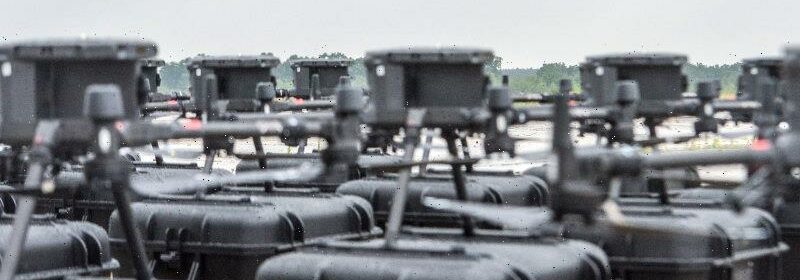Australia dispatches $33 million worth of drones as Ukraine marks ‘year of resistance to aggression’

Australia will send military drones to Ukraine to help soldiers gain battlefield intelligence and defend their territory amid fears of a barrage of Russian missile strikes on the anniversary of an invasion that has displaced 14 million people.
The new pledge will cost $33 million and will take the value of Australian military support to $510 million, alongside medical and other humanitarian support and another wave of economic sanctions against Russian leaders linked to the country’s president, Vladimir Putin.
Drones purchased for the Ukraine army. Australia will send a further $33 million worth of drones to help with the war effort. Credit:Getty
Deputy Prime Minister and Defence Minister Richard Marles will announce the new aid on Friday with a vow to back Ukraine for “as long as it takes” to end the illegal invasion.
Ukrainian first lady Olena Zelenska will send a personal message to Australians on Friday to thank them for their support in a war that she describes as an attack that endangers all countries.
“There are oceans and thousands of kilometres between us, but unfortunately there are no distances for war and grief,” she says in a video.
“Today we do not mark the year of full-scale war – we mark the year of resistance to aggression, a year of mutual assistance, a year of humanity, which Ukrainians show in saving each other, and which you show as well.
“And I believe that humanity and mutual assistance will prevail. We will win. Together with you.”
First Lady of Ukraine Olena Zelenska says this is the anniversary “of the resistance”. Credit:Markus Schreiber
Ukrainian authorities warned citizens to expect a wave of Russian attacks on Friday to mark the February 24 invasion, when Russian tanks crossed the border in an attempt to seize the capital, Kyiv, while missiles rained down on Ukrainian cities.
While many Ukrainians consider the war to have begun in 2014 when Russia annexed Crimea and launched incursions into the Donbas region, the escalation to a much larger conflict over the past year has left 14 million displaced, according to the United Nations human rights office.
The war had left at least 100,000 soldiers killed or wounded on each side, according to estimates from the Pentagon last November, and had killed 8000 non-combatants and injured another 13,000, according to the United Nations.
Days after a surprise visit to Kyiv, United States President Joe Biden told a rally in Poland that the world was tested when Putin launched the invasion but that 50 nations had joined a coalition to defend Ukraine.
“Ukraine will never be a victory for Russia. Never,” he said.
“President Putin chose this war. Every day the war continues is his choice. He could end the war with a word.”
Meanwhile, Putin held talks in Moscow with Chinese foreign minister Wang Yi and spoke of “new frontiers” in the relationship, heightening Western concerns about greater military co-operation between the two countries and triggering the Pentagon to warn: “There will certainly be consequences for China should they deepen their relationship with Russia.”
The Australian commitment to Ukraine adds to military aid including 90 Bushmaster armoured vehicles, 28 M113 armoured vehicles, six 155mm howitzers, an agreement with France to supply 155mm ammunition, unmanned aerial systems, anti-armour weapons and de-mining equipment.
Australia has also sent 70 personnel to the United Kingdom to train Ukrainian troops.
“The Ukrainian people have shown immense bravery and determination in defending their homeland against Russia’s illegal invasion, and Australia will stand with Ukraine for as long as it takes,” said Marles in a statement.
The government is also imposing financial sanctions and travel bans on 90 people and 40 entities, taking the Australian action so far to 1000 sanctions on those who are complicit in the invasion.
“Australia is imposing additional sanctions, targeting those in the Russian government who are helping prolong this war, those financing this war, and those spreading mistruths to justify this war,” said Foreign Minister Penny Wong.
“Australia’s sanctions regime against Russia is our largest. This reflects our support for the people of Ukraine and for the fundamental norms of sovereignty and territorial integrity.”
Ukraine’s ambassador to Australia, Vasyl Myroshnychenko, will address the National Press Club on Friday with a message that the year ahead should be about “winning for the world’s sake” to end the war.
“Australian support has been so welcome and so vital,” he says in a draft of his remarks.
“Now, moving into year two, mutual victory requires that our allies’ support be sustainable and systemic. That’s the difference between defending a mate and winning a better world for everyone.”
Billionaire Andrew Forrest will also mark the first year of full-scale war by stepping up his commitment by financing hundreds of power generators to be sent to Ukraine in the coming weeks, helping cities hit by Russian missile strikes on power systems.
“It is absolutely urgent, so we got the power generators from wherever we could,” he said.
The Forrest family’s Minderoo Foundation has funded humanitarian initiatives in Ukraine (including grain shipping and storage) while family company Tattarang has pledged $500 million to the Ukraine Green Growth Initiative to rebuild energy and communications infrastructure.
Cut through the noise of federal politics with news, views and expert analysis from Jacqueline Maley. Subscribers can sign up to our weekly Inside Politics newsletter here.
Most Viewed in Politics
From our partners
Source: Read Full Article

